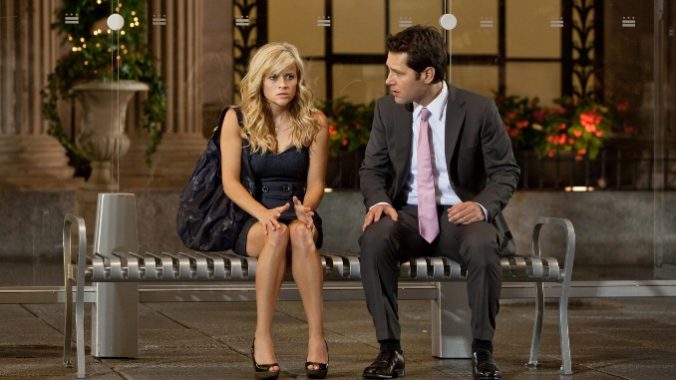The 10 Paul Ruddiest Paul Rudd Performances of All Time

The Marvel Cinematic Universe has turned a whole lot of beloved actors into superheroes, bringing them exposure to a wide swath of audiences and even, sometimes, the appearance of box office magnetism they may not have always possessed. Of course, Robert Downey Jr. was a well-known actor before Iron Man, but that movie turned him into a bona fide star by distilling certain aspects of his persona—the rapid-fire patter, the intelligent smarm, the off-kilter comic timing—into a super-charged, crowd-pleasing package. The same could be said of Mark Ruffalo’s Hulk, Scarlett Johansson’s Black Widow, or Chadwick Boseman’s Black Panther, among others. It’s less true, however, for Paul Rudd.
Despite retrofitting the character of Ant-Man to Rudd’s charms—distinct from Downey’s, but not too far apart from his innately comic likability—and producing three successful solo films, Scott Lang still plays a bit like Paul Rudd Lite. In other words, his performances in the Ant-Man trilogy lack a certain essential Paul Rudd-y quality. A Rudd fan might well leave the likes of Ant-Man and the Wasp: Quantumania unsatisfied, grasping onto just a few moments of doofus-y glory amidst an increased emphasis on universe-shifting actions and a disconnected ensemble cast. The movie’s few scenes of Scott Lang strolling around his San Francisco neighborhood feel like the “real” Paul Rudd skipping through a normal Paul Rudd movie, on his way to something that asks both more and, in its own way, far less of his skill set.
What, then, are examples of Rudd at his purest and Ruddiest? For any casual or newfound Rudd fans who have enjoyed his recent superhero run but haven’t experienced the full breadth of his onscreen performances, we’ve compiled this list. To be clear, these are not necessarily his all-time best performances (though many of them are), nor his best overall movies (though many of them are that, too, albeit in a wildly inaccurate order). These are the movies where Paul Rudd most clearly defines himself on screen, via his most inimitable qualities, from his light-footed physicality to his mixture of goofy enthusiasm and wide-eyed sarcasm. Rudd has taken an unusual path through movie stardom; these movies reveal the gracefulness behind that navigation.
Here are the 10 Paul Ruddiest Performances by Paul Rudd:
10. Clueless
Obviously, there’s great power to Rudd’s Clueless performance, not least for its ability to leapfrog over his truly off-putting work in Halloween 6 and establish him as a viable leading man. That said, as much as Rudd obviously has it in this movie, there are certain limiting factors that prevent it from climbing higher on this list. Rudd need not play a hilarious wiseass; in fact, many of his Ruddiest roles have a sincerity similar to his Clueless character Josh—the stepbrother-turned-love-interest of Alicia Silverstone’s Cher. But Josh’s “complaint rock”-listening, politically active, slightly hangdog nice guy doesn’t have quite the same spring in his step that Rudd would gain in later parts—including one in a far less famous movie by Clueless auteur Amy Heckerling.
9. Our Idiot Brother
“I’ll watch Dune with you!” With one indescribably delightful line-reading, Ned—a dopey, feckless hippie type you’d expect Rudd to caricature in a one-scene cameo, not make the subject of a feature film—becomes a major Rudd character. The context: Jeremy (Adam Scott), neighbor and potential love interest of Ned’s sister Miranda (Elizabeth Banks), walks into Miranda’s apartment mentioning that the director’s cut of David Lynch’s Dune is about to start on Showtime. Ned, open-hearted and enthusiastic to a fault, immediately offers to watch Dune with his sister’s friend and starts doing an obtuse bit from the cult film. It’s 30 seconds of screen time that doubles as shorthand for the ingratiating buddy energy Rudd brings to so many projects—an easy explanation for why he stars in more comedies about male friendship than traditional rom-coms.
8. Anchorman: The Legend of Ron Burgundy
Like Our Idiot Brother, this is an outlier character that Rudd manages to turn back around, somehow, into something essential and of a piece with his more grounded work. As Brian Fantana, Rudd is playing an absolute buffoon opposite world-class buffoons Will Ferrell, David Koechner, and Steve Carell, as part of the Channel 4 News Team; no question that he’s got the chops to do this, but what makes Fantana a particularly Ruddy version of a cartoony ’70s chauvinist? With Ferrell as the pompous ringleader, Koecher on hound-dog duty, and Carell playing a blithering idiot, Rudd brings a boyish energy to the team; he’s the one proudly showing off his closet full of noxious colognes (or, in the sequel, specialty condoms), presiding over “Panda Watch!” and wistfully recalling a makeout session in a K-mart bathroom, wondering if it was true love. It’s a prescient use, even subversion, of Rudd’s forever-young charm.
7. Captain America: Civil War
As mentioned in the intro, Paul Rudd isn’t really at his best playing Scott Lang… in the Ant-Man movies. He is, however, quite hilarious in the part when thrust into bigger Avengers adventures, and freed of the miniscule, ant-sized “anti-” pointlessly affixed to his “hero” in the main Ant-series. In Captain America: Civil War, which is more of a proper Avengers movie than the Langless Infinity War, Scott is recruited to pick a side in the fight between Iron Man (b/w War Machine, Black Panther, Vision, Spider-Man, and, temporarily at least, Black Widow) and Captain America (b/w Hawkeye, Bucky, Falcon, and Scarlet Witch). Ultimately, his dorky enthusiasm combined with his lack of deep-cut Avengers knowledge (cheerfully referring to Hawkeye as “arrow guy”) helps tip the scales in favor of Cap—and his self-delighted reaction to reversing his ant-suit’s tech to briefly become Giant Man is one of the Ruddiest moments in cinema.
-

-

-

-

-

-

-

-

-

-

-

-

-

-

-

-

-

-

-

-

-

-

-

-

-

-

-

-

-

-

-

-

-

-

-

-

-

-

-

-








































